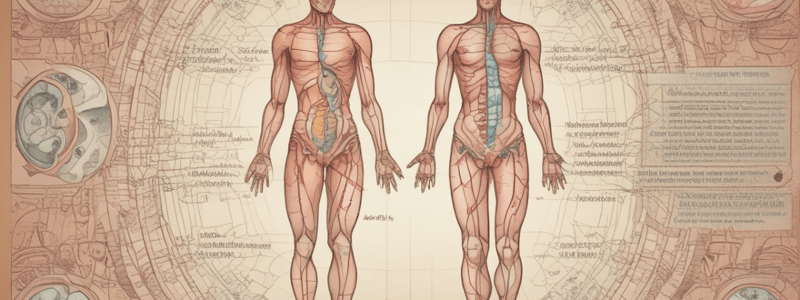Podcast
Questions and Answers
What is the main function of the pituitary gland in the endocrine system?
What is the main function of the pituitary gland in the endocrine system?
- To produce and secrete hormones directly
- To convert hormones into energy
- To transmit information from the nervous system to other glands
- To sense and regulate hormone levels in the blood (correct)
What is the term used to describe organs that secrete internally?
What is the term used to describe organs that secrete internally?
- Endocrine (correct)
- Exocrine
- Hormonal
- Metabolic
What is the function of the hypothalamus in the endocrine system?
What is the function of the hypothalamus in the endocrine system?
- To produce insulin and regulate blood sugar
- To integrate information from the nervous system and other glands (correct)
- To secrete hormones that stimulate growth and development
- To regulate body temperature and blood pressure
What are hormones responsible for regulating in the body?
What are hormones responsible for regulating in the body?
Which of the following glands is responsible for regulating hormone levels in the blood?
Which of the following glands is responsible for regulating hormone levels in the blood?
What is the primary function of the thyroid gland?
What is the primary function of the thyroid gland?
What is the role of the parathyroid gland?
What is the role of the parathyroid gland?
What is the function of the thymus gland?
What is the function of the thymus gland?
What is the primary function of the hypothalamus?
What is the primary function of the hypothalamus?
What is the role of insulin in the body?
What is the role of insulin in the body?
Flashcards are hidden until you start studying
Study Notes
Endocrine System Definition
- The endocrine system is a network of glands that produce and secrete hormones internally
- Glands produce and release hormones, which are chemicals that travel to organs, skin, tissues, and muscles in the body
Endocrine System Function
- The main function of the endocrine system is to regulate and monitor hormone levels in the blood
- Hormones regulate moods, growth, metabolism, development, and reproduction
- The pituitary gland senses hormone levels and relays information to other glands to produce or stop producing hormones
Parts of the Endocrine System
- The endocrine system consists of several glands, including:
- Hypothalamus: regulates and controls the endocrine system, combining information from the nervous system and other glands
- Pituitary gland: produces hormones that control other glands, such as the thyroid and adrenal glands, and testes and ovaries
- Thyroid gland: regulates metabolism by producing the thyroid hormone
- Parathyroid gland: maintains bone health by balancing calcium levels in the blood
- Thymus gland: produces white blood cells (T-lymphocytes) and is critical for the immune system
- Adrenal gland: produces adrenaline and is responsible for the body's fight or flight response
- Pancreas: produces insulin, regulating sugar levels in the blood and controlling energy levels
How the Endocrine System Works
- The endocrine system continuously monitors hormone levels in the blood, maintaining homeostasis and optimal bodily functioning
- Hormones travel through the blood to target organs or cells, where they initiate cellular changes corresponding to their function
- The endocrine system regulates processes such as cellular metabolism, sugar and nutrient homeostasis, blood pressure, heart rate, sleep, digestion, and sexual development
Studying That Suits You
Use AI to generate personalized quizzes and flashcards to suit your learning preferences.




